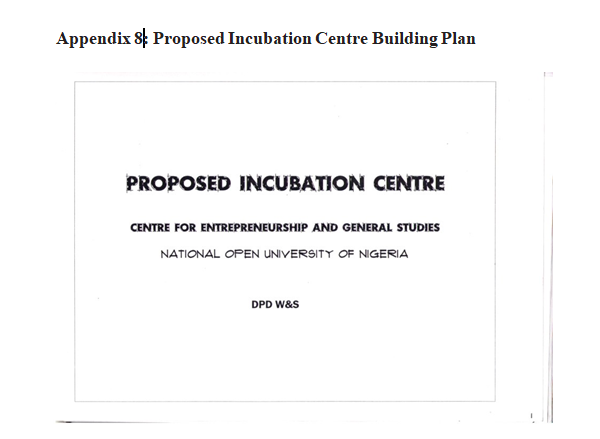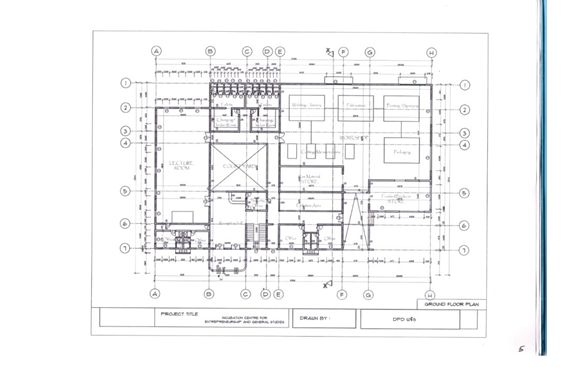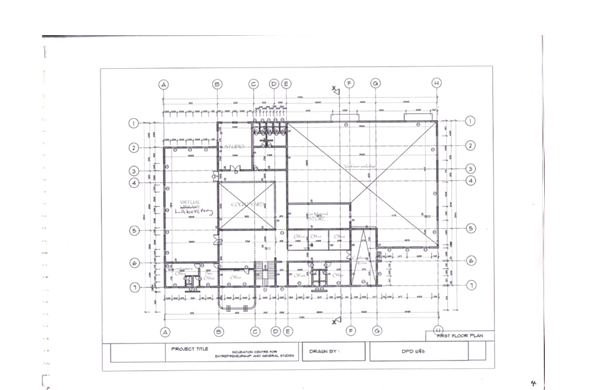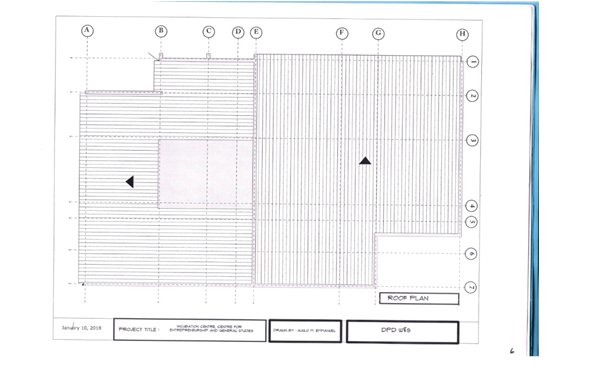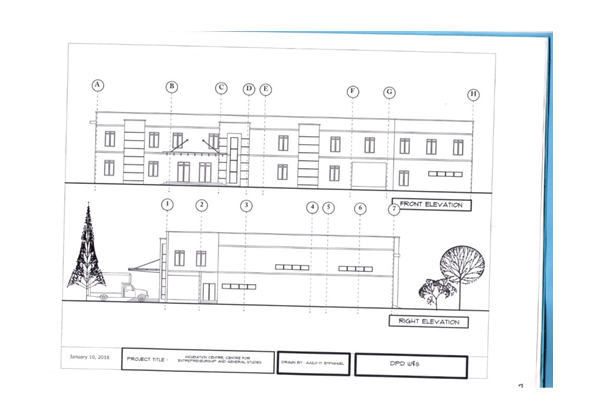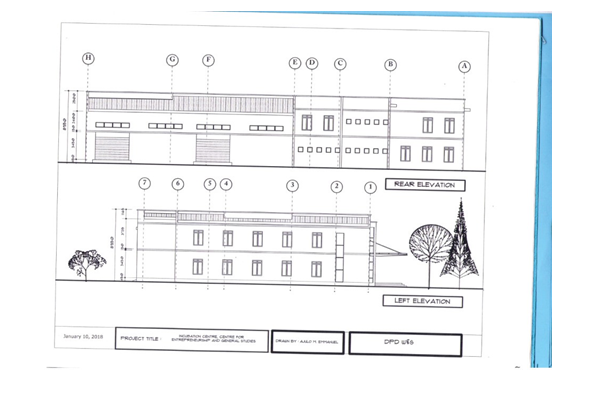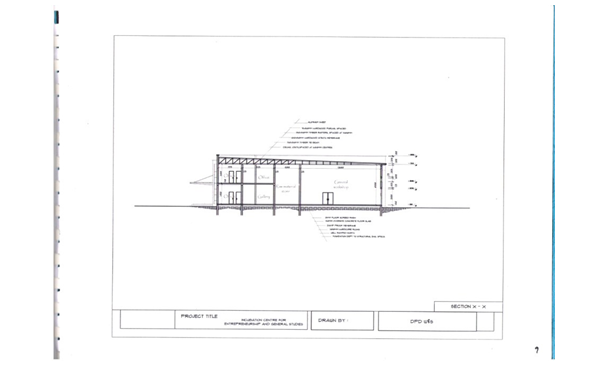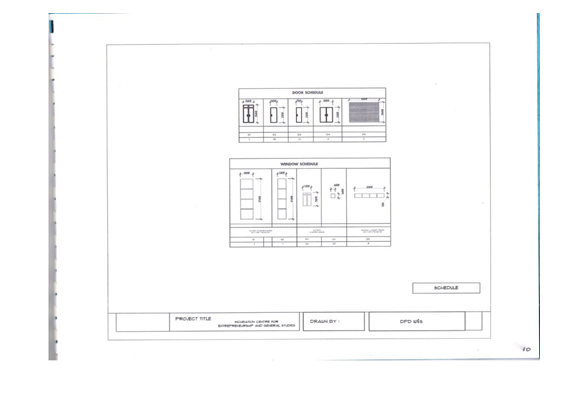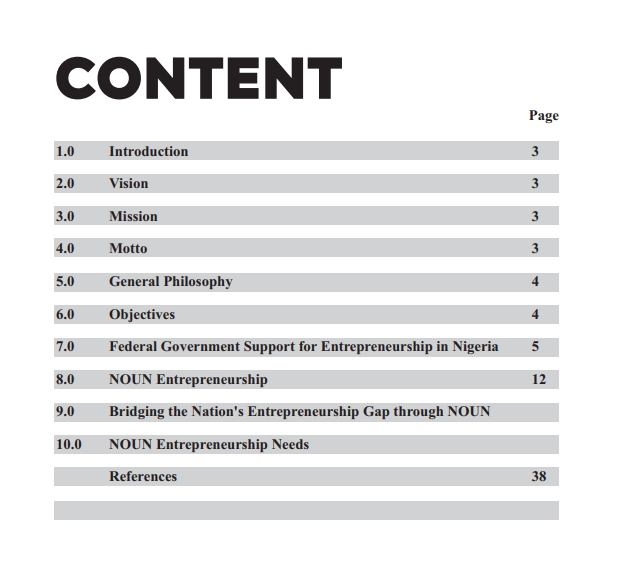
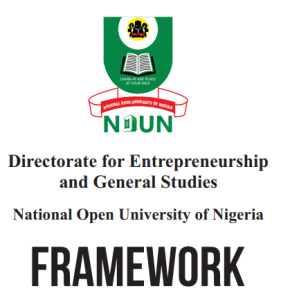
1.0 Introduction
The Directorate for Entrepreneurship and General Studies (DE&GS) was established on the 11th May 2017 as Centre for Entrepreneurship and General Studies (CE&GS). Based on the activities of the Centre the nomenclature was changed by the University Management from Centre for Entrepreneurship and General Studies to Directorate for Entrepreneurship and General Studies (DE&GS) on 21st May 2019. First and foremost, the Directorate being an arm of the university services NOUN students in acquiring general skills that will lead to lifelong learning and employability. Secondly, the Directorate provides services for the general community through training, consultancy, and research.
Therefore, the mandate of the Directorate is to inculcate lifelong learning skills, create entrepreneurs by inculcating entrepreneurial skills, helping the students to discover their creativity and innovation, take initiative, utilise possibilities, take risk and responsibilities.
2.0 Vision
To be regarded as the foremost entrepreneurship and general study centre anchored by the university to provide sustainable entrepreneurial skills and general knowledge through comprehensive reach that exceeds all barriers.
3.0 Mission
To provide functional cost-effective flexible learning which adds life-long value to student’s entrepreneurial initiative, creativity, research, and innovation.
4.0 Motto
Explore. Develop. Deliver.
5.0 General Philosophy/Goal
The Directorate has two main functions – to build soft skills into the students by exposing them to general courses and to prepare them to be self-reliant. Hence the focus on entrepreneurship and general studies. Therefore, the goals are to produce:
- Graduates with some value addition over and above their field of study for being self-reliant.
- A well-rounded, morally and intellectually capable graduates with vision and entrepreneurial skills in an environment of peace and social
6.0 Objectives
Specifically, the objectives are:
- Acquisition, development, and inculcation of the proper value-orientation for the survival of an individual and
- To prepare the students for a post university life with opportunities for job creation and entrepreneurial
- To promote the culture of entrepreneurship among NOUN
- To identify students with creative and innovative ideas for start-ups.
- To produce graduates who will be capable to communicate effectively.
- To develop the intellectual capacities of the students to understand, appreciate and promote peaceful co-existence.
- To produce graduates with broad knowledge of the Nigerian Nation and people with a view to inculcating in them mutual understanding and patriotism.
- To expose graduates of National Open University of Nigeria to the rudiments of ICT for computer literacy and ability to live usefully in this ICT
7.0 Federal Government Support for Entrepreneurship in Nigeria
It is observed by Nigerian government that Micro, Small and Medium Enterprises (MSMEs) improves the country’s Gross Domestic Product (GDP) through human capital development, expand in technical expertise, increase in employment, more competition leading to better products and services, and promotion of indigenous entrepreneurship. This is evident from records and enterprise classification by MSMEs.
The National Policy on MSMEs classified the enterprises. Enterprises with workforce of less than 10 and with total assets of less than 5 million naira excluding land and buildings is regarded as Micro Enterprises. When the workforce is 10 to 49 with total assets above 5 million naira and not exceeding 50 million naira excluding land and buildings are classified as Small Enterprises. Enterprises with workforce of 50 – 199 and with total assets above 50 million naira and not exceeding 500 million naira excluding land and buildings are classified as Medium Enterprises.
However, employment base classification takes precedence where the total assets exceed the workforce e.g. an enterprise with maximum workforce of 20 but has maximum assets of 60 million naira will still be classified as Small Enterprise irrespective of the total assets.
Federal government made several steps to strengthen MSMEs in Nigeria. Prominent amongst others were the federal government development banks. Nigerian Industrial Development Bank Ltd (NIDB) and Nigerian Bank for Commerce and Industry (NBCI) were established in 1980s to boost MSMEs. But MSMEs started to face difficulties during the Structural Adjustment Programme (SAP) due to several devaluation of the naira. At this point most MSMEs could not sustain the required fund to buy the amount of foreign exchange needed for raw materials. This led to the fall in Nigerian economy when the country became over dependent on other economies. The aftermath of this is that Nigeria became a dumping ground of foreign goods of which most were sub- standard and increase in unemployment.
Commercial banks were observed to have systematically moved away from financing MSMEs after the demise of NIDB and NBCI. However, federal government did not give up. The federal government through Central Bank of Nigeria (CBN) lunched Small and Medium Enterprises Equity Investment Scheme (SMEEIS) in August 2001. This scheme was a voluntary initiative of the Bankers’ Committee approved at its 246th Meeting held on 21st December 1999. The scheme was developed as a response to federal government concern and policy measure to promote Small and Medium Enterprises (SMEs) towards achieving sustainable economic development, poverty alleviation and employment generation. Through this scheme, MSMEs were to get loans on single digit interest rate. This was to help them reduce the burden of accessing fund for business whereby they were able to acquire more productive assets and develop human capital.
With the move to reduce poverty through wealth and job creation, and to facilitate the scope of economic transformation, The Small and Medium Enterprises Development Agency of Nigeria (SMEDAN) was established in 2003. The mandate of SMEDAN is to facilitate the promotion and development of Micro, Small and Medium Enterprises (MSMEs) to ensure sustainability of the sector. SMEDAN guiding principles are outreach, sustainability, and efficiency.
Other developing financing set up were: Agricultural Credit Guarantee (ACGSF) with focus on innovations. Three schemes were developed to foster the innovation. They were Self-Help Group Linkage Banking launched under Agricultural Credit Guarantee Scheme (ACGS) in 1991 and became operational in 1992. The scheme was set up to help farmers. The second scheme was The Trust Fund Model. This was a framework set up to enhance credit supply to agricultural and rural sectors, and lastly on this category was the Interest Draw Back (IDB) that was developed as an interest rate management framework under ACGSF.
Nigeria is both oil and agrarian country with major palm oil, corn, rice, sorghum, millet, cassava, cocoa, groundnuts, rubber, and yam as commodities. The Central Bank of Nigeria (CBN) undertook surveillance on domestic and foreign commodity production and prices towards policy development and advice. As a means of enhancing financial services delivery, the 2005 Microfinance Policy, Regulatory and Supervisory framework for Nigeria was revised in April 2011.
With the recognition that Nigerian youths are the one to drive the economy recovery and the diversification required for economy recovery, Youth Entrepreneurship Development Programme
(YEDP) was established on 15th March 2016. The target
beneficiaries were members of the National Youth Service Corps (NYSC) and non-NYSC who are not more than five years post- NYSC. Those with lower qualifications were also considered but must possess a recognised tertiary education certificate or artisans with first leaving school certificate or technical certificate, or accredited proficiency certificate.
The financing of YEDP was focussed on start-ups, agriculture value chains such as poultry, fish farming, piggery etc, creative industries such as tourism, crafts and arts and Information and Communication Technology (ICT). This plan would have helped in job creation but today, the impact is not much because those that gained from the scheme was found to have lacked entrepreneurship education and mentorship. This was revealed in
the interview held with some of the stakeholders in the project. It was only in the North East a significant impact was made where so many of them bought tricycles for transportation.
In May 2010, the Bank of Industry (BOI) was established. Out of 500 billion debenture stock issued to BOI N200 billion was met for reframing and restructuring of banks, existing loans and portfolios to Nigeria SMEs. As compliment to BOI, another N200 billion Small and Medium Enterprises Credit Guarantee Scheme (SMECGS) was established to provide guarantee for credit from banks to SMEs and manufacturers, and to increase access of SME promoters.
Over the years Federal government has always supported MSMEs through CBN monetary policies. The monetary policies were derived from CBN Act of 1958 amended in CBN Decree No. 24 of 1991, CBN Decree Amendment 1993, No 3 of 1997, No.4 of 1997, No 37 of 1998, No 38 of 1998, 1999 and CBN Act of 2007.
In August 15, 2013, CBN launched Micro, Small and Medium Enterprises Development Fund (MSMEDF) with a share capital of N220 billion. The broad objective of the Fund was to channel low interest funds to MSME sub-sector of the Nigerian economy through PFIs to enhance access by MSMEs to financial services, increase productivity and output of microenterprises, increase employment, and create wealth and engender inclusive growth. Long term single digit loans at 9% p.a. was the focus. It was also stated that only 10% of the fund should be channel to trade and commerce. This implies that focus was more on industrialisation and production.
It is also on record that CBN in 2008 established Entrepreneurship Development Centres (EDCs) in South West, North West and South East to address the rising unemployment youths. The success achieved at that time led CBN to EDCs in South South, North East and North Central in 2013. The question is what is the position of this laudable centres?
The CBN Governor (Mr. Godwin Emefiele) in his statement during his 2019 Policy Thrust emphasised the bank strong
commitment to creating wealth through strong policies for creating jobs for the growing population. Thereby, included policy that will favour lending to MSME.
Also, in the recent National Youth Entrepreneurship Empowerment Summit held in Abuja on Thursday 23rd May 2019, The Vice President of Federal Republic of Nigeria (Prof. Yemi Osinbajo) said that the Federal Government initiative in setting up entrepreneurship bank is to scale up the interventions of the federal government as a keyway through which entrepreneurship can be directly financed. He said it will have a shift from the current practice of entrepreneurship sponsorships that is built around CBN and BOI. The focus of the entrepreneurship banks will be on entrepreneurship development and to encourage small and medium size enterprises. It was during this summit one NOUN student (Bosede Alabi) won a grant of N1,000,000.00 as she displayed her innovation in knitting cotton wears for different ages.
Federal government of Nigeria also established National Board for Technical Incubation (NBTI) under Federal Ministry of Science and Technology. The mandate of NBTI is to: “facilitate the establishment and coordinate the activities of Technology Incubation Centres and Science & Technology Parks which are designed to nurture new technology based start-up businesses nationwide” (NBTI). The specific mandate is to encourage production and commercialisation of R&D output inventions, source for funds for implementation of programmes, to help research establishments and tertiary institutions commercialise their R&D. This was however the major move to integrate the academic into entrepreneurship.
NBTI has 28 Technology Incubation Centres: Lagos, Kano, Aba, Nnewi, Minna, Warri, Gusau, Bauchi, Sokoto, Akure, Ibadan – Temidire Extension Ogbomoso, Owerri, Abeokuta – Odogbolu Extension and Owode Yewa, Jos, Yenagoa, Enugu, Jalingo, Kaduna, Ado Ekiti, Gombe, Uyo, Ilorin, Ile-Ife, Katsina, Birnin Kebbi, Calabar, and Maiduguri. These centres are managed by federal government in collaboration with various host state. As at
today most of the centres are not meeting the mandate.
Still in the move of looking for ways to solve increasing unemployment among youths, teaching of entrepreneurship was introduced into tertiary education. It is in this regard that the National Universities Commission introduced two entrepreneurship courses as compulsory general studies courses for all undergraduate students in Nigerian universities starting 2011. This move was the first time of building entrepreneurship education. However, the integration has not been so successful in meeting the mandate because of the structure.
From the narration, it could be observed that federal government has made so much efforts to encourage entrepreneurship development in the area of access to finance. The question therefore is why we still have increase unemployment and lack of sustainability in MSMEs. From the research conducted among MSMEs, it was found that most of them do not breakeven because of the lack of entrepreneurship education and mentorship. This is where NOUN comes in, to structure entrepreneurship process that could help in achieving the national mandate. NOUN has a structure that brings the faculties, industries and government together to build young entrepreneurs.
7.1 Gap in Entrepreneurship Support in Nigeria and the role of NOUN
The existing gaps are:
- Lack of adequate entrepreneurship education and m e n t o r s h i p . S t a r t – u p s w i t h o u t a d e q u a t e entrepreneurship education and mentorship has hampered government efforts in entrepreneurship Going into business out of frustration and i n d i v i d u a l fi n a n c i a l n e e d s c a n n o t s u s t a i n entrepreneurship in Nigeria.
- Misconception of entrepreneurship education, vocational training, and As much as these
concepts are key in economic development, each has role in economic growth.
- Misconception between a businessman and an
- There is lack of synergy between the university, government, and industry in entrepreneurship It appears there will be more success in entrepreneurship development if university drives the process.
- There is no academic enabling environment for youths to discover their creativity and innovations. Waiting till after graduation before given support without adequate prior preparation will not bring expected
- Most universities focus on vocational training rather than entrepreneurship education and Universities need to shift their teaching of entrepreneurship from vocational training to entrepreneurship education that support creativity and innovation.
- M o s t u n d e r g r a d u a t e s t u d e n t s s e e g e n e r a l entrepreneurship studies in schools as distraction from their main discipline. There is a need for re-orientation for entrepreneurship
- There is neglect in the empowerment of social
8.0 NOUN Entrepreneurship
NOUN entrepreneurship prepares student entrepreneurs by taking them through entrepreneurship education and mentorship through the Directorate for Entrepreneurship and General Studies (DE&GS) with focus on meeting the Sustainable Development Goals (SDGs) towards achieving 2030 Agenda for sustainable development and beyond.
- For the Entrepreneurship Education, students take courses that will help them discover their creative and innovative abilities and imbibe skills that will help them manage their entrepreneurial development. In addition, they take other courses that will help them co-exist with others and soft skills that will enhance their entrepreneurship development. All undergraduate students take these courses as General
During entrepreneurship education, the students learn how to:
- Discover and direct their innate abilities for economic viability.
- Improve on their creativity and
- Direct their passion for their new
- Manage creativity and
- Relate with other people and the society for peaceful co- existence.
DE&GS differentiates an entrepreneur from a businessman. A businessman sets up an existing idea and create place in an existing market. But NOUN is interested in new idea start- ups, intuitive reasoning, new markets and developing risk bearers, creators, innovators, and adding value to existing economic development.
To end the entrepreneurship education process, students take
examination and are given opportunity to present their innovative idea along with their business plan. It is at the presentation point that students with creative and innovative ideas are discovered. These group of students are automatically enrolled into NOUN Incubation Centres. Those with business mind receive start-ups support while the non-business minds are released to use the entrepreneurial skills gained in their daily endeavours. Not everyone can be an entrepreneur, but to drive the economy, you need an entrepreneur.
Student idea presentation is measured against any of the 17 SDG Goals:
- No poverty
- Zero hunger (hunger and food security)
- Ensure healthy lives and promote well-being for all ages (containing sever diseases such as malaria, tuberculosis, polio, spread HIV/AIDS)
- Ensure inclusive and quality education for all and promote lifelong
- Gender equality
- Ensure access to water and sanitation for
- Affordable and clean energy (energy in various forms, especially electricity)
- Promote inclusive and sustainable economic growth, employment, and decent work for
- Industry, innovation, and infrastructure (infrastructure development such as water management, transport, energy and information communication technology and health education)
- Reduce inequality (promote resources and expertise)
- Sustainable cities and communities
- Responsible consumption and production
- Urgent action to combat climate change and its impact.
- Conserve and sustainably use the oceans, seas, and marine
- Life on land
- Promote just, peace and inclusive
- Partnerships for the Goal (Develop multi- stakeholder partnerships to share knowledge, expertise, technology, and financial support
To make it manageable during presentation and mentorship, the SDGs are grouped into four categories:
- Wellbeing: This covers Goals 1, 3, 4, 5, 10 & 16
- Infrastructure: This covers Goals 2, 6, 7, 8, 9, & 11
- Natural Environment: This covers Goals 13, 14, & 15
- Partnership: This covers Goal 17
Students’ enterprise idea presentations end the entrepreneurship education stage which is also classified as the Pre-Incubation Stage.
- Mentorship
The mentorship process begins once a student has been admitted into the Incubation Centre. NOUN has seven incubation centres across the geo-political zones in Bogoro, Maiduguri, Kano, Abuja, Enugu, Uyo and Lagos. NOUN operates both Resident and non-Resident Incubation. In this regard, resident means that some students are given space within the Incubation Centres as start-up or working space under the guidance of the university. The non-residents have their start-ups or working spaces outside NOUN residence but receive equal guidance with those that are resident. The non-Residents also have equal access to the equipment at the Incubation centres. However, NOUN has limited spaces for resident.
The admission is not limited to students with innovation in
production but to all innovations including research and social entrepreneurship. There are some students who have innovative ideas that call for further research. These set of Incubatees are supported by providing technical support in the research and collaborate with other bodies where certain equipment may be required for the study.
The incubation period for students is between 1 – 3 years. They start their incubation period at 400 level. This gives them opportunity to have a good start-up at graduation.
There is adequate documentation of admission and progress of Incubatees. The time of students’ graduation from the Incubation period is not uniform. The incubation period varied depending on their innovation. Students’ graduation is launched with start- ups.
The Post-Incubation period last for one year. Where the Coordinators of each Incubation Centres follow-up the graduate progress to ascertain stability before final release.
Activities in Incubation Centres:
- Educate the Incubatees on:
- Development of Innovative Idea
- Market Research
- Business Management Process
- Human Relations
- Marketing Strategy
- Financial Literacy
- Costing
- Budgeting
- Sourcing for Fund
- Revenue Budget
- Expenditure Budget
- Book-Keeping
- Filing for Taxes
- Financial Reporting
- Business Communication
- Record Keeping
- E-Business and Digital Marketing
- Business Sustainability
- Statutory Agencies in Business
- Writing Business Plan/Proposal for sponsorship
- Business Registration
These topics are developed into self-driven e-book and print. They are facilitated both virtually and face- to-face for the first one year of incubation. The Table below shows the implementation plan.
S/N | Topic | Month | Facilitation |
1 | Registration and Documentation of Incubatees | 1st |
· Students receive non- facilitated virtual learning in an LMS at the beginning of the month. · On the last Monday of every month, students will interact with a facilitator virtually or face-to-face for two hours from 3 – 5 pm. |
2 | Development of Innovative Idea | 2nd | |
3 | Market Research | 3rd | |
4 | Business Management Process | 4th | |
5 | Human Relations | 5th | |
6 | Marketing Strategy | 6th | |
7 | Financial Literacy | 7th | |
8 | Business Communication | 8th | |
9 | Record Keeping | 9th | |
10 | E-Business and Digital Marketing | 10th | |
11 | Business Sustainability | 11th | |
12 | Writing Business Plan/Proposal for sponsorship | 12th | |
13 | · Statutory Agencies in Business · Business Registration | 13th |
- Guide the business registration with Corporate Affairs Commission (CAC)
- Provide equipment and facilities for
- Active involvement in innovative research
- Provide expertise
- Idea Simulation
- Protect the rights of
- Start-ups
- Collaboration with Industries and Research Institutes for guidance and mentorship
- Collaborate with governments and non-government agencies such as Raw Material Research and Development Council (RMRDC), Federal Institute of Industrial Research, National Agency for Science and Engineering Infrastructure (NASENI), National Office for Technology Acquisition and Promotion, National Agency for Food & Drug Administration and Control (NAFDAC), National Space Research and Development Agency Ministry of Science and Technology (NASRDA), National Centre for Technology Management (NACETEM), Energy Commission of Nigeria, National Biotechnology Development Agency (NABDA), United Nations Industrial Development Organisation (UNIDO), Small & Medium Enterprises Development Agency of Nigeria (SMEDAN), Central Bank of Nigeria (CBN), National Board for Technology Incubation (NBTI), Standards Organisation of Nigeria (SON), Bank of Industry (BOI), Bank of Industry Limited, International and Tropical Agriculture (IITA) Ibadan, Eupepsia Place Ltd (sFarm Lab) etc. for quality product and service delivery
This is further expressed in Figure 1:


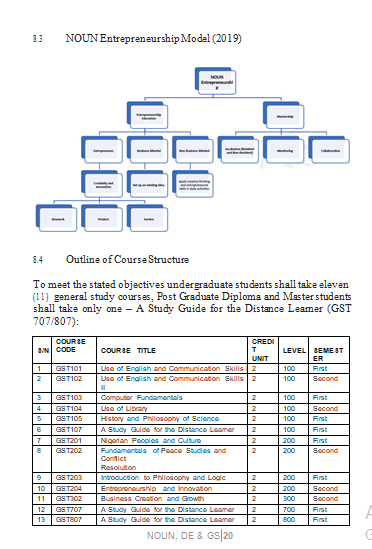
Note:
- Art, Education (Arts, Social Science and Foundation) and Social Science programmes are to register for GST 105 – History and Philosophy of Science
- Science programmes including Science Education are to register for GST 203 – Introduction to Philosophy and Logic
- All general studies courses are facilitated
- All GST courses examinations are e-examinations except GST302 that is 40% e-examination and 60% for practical through business plan presentation and enterprise
- All direct entry students must take GST107 in addition to their 200 level GST
- All graduate students who finished from NOUN are excepted from GST707/807/907
- Course content specifications/syllabus of all courses
GST101: Use of English and Communication Skills 1 (2cr)
Effective communication and writing in English, Language skills, Writing of essay answers, Comprehension, Sentence construction, Outlines and paragraphs, Collection and organization of materials and logical presentation, Punctuation.
GST102: Use of English and Communication Skills 2 (2cr)
Logical presentation of papers, Phonetics, Instruction on lexis, Art of public speaking and oral communication, Figures of speech, Précis, Report writing.
GST103: Computer Fundamentals (2cr)
Basics of computer and computer system, Word Processing, Spreadsheet, Graphics, Storage Devices, Computer Network and Internet, Network Devices, Basic Internet Securities, Basic programming.
GST104: Use of Library (2cr)
Types of Library and Services: Types of Library: Library Services. Research Techniques: Information Sources; Literature Review; Databases Contents; Open Educational Resources. Organization of Library Materials: Library Catalogues; Classification of Library Materials. ICT Use in the Library: Digital Libraries; Computer Based Literature Search. Good Reading Habit/Study Skills: Basic Study Techniques / Methods; Study Habits; Handling Examinations. Copy Right; Plagiarism and Referencing: Copyright Laws; Plagiarism and Its Implications; Citation and Referencing; APA In-text citing and Referencing.
GST105: History and Philosophy of Science (2cr)
Man – his origin and nature, Man and his cosmic environment, Scientific methodology, Science and technology in the society and service of man, Renewable and non-renewable resources – man and his energy resources, Environmental effects of chemical plastics, Textiles, Wastes and other material, Chemical and radiochemical hazards, Introduction to the various areas of science and technology. Elements of environmental studies.
GST107: A Study Guide for the Distance Learner (2cr)
Introduction to The Open and Distance Learning (ODL) System: History of the Open and Distance Learning System, Characteristics of the Open and Distance Learning System, & Teaching and Learning in the Open and Distance Learning System. Study Skills for The Distance Learner: Listening, Speaking, Reading, Writing, & Study Strategies. Assessment and Evaluation Modes in Open and Distance Learning (ODL): Overview of Assessment In ODL, Instructional- Based Assessment Modes, Semester Examination, & Assessment of Non-Examinable Courses. Learners’ Support Services: Definition and Purposes of Learners’ Support Services, Types of Learners’ Support Services, Sources of Learners’ Support Services, & Benefits of Learners’ Support Services.
GST201: Nigerian Peoples and Culture (2cr)
Study of Nigerian history, culture and arts in pre-colonial times, Nigerian’s perception of his world, Culture areas of Nigeria and their characteristics, Evolution of Nigeria as a political unit, Indigene/settler phenomenon, Concepts of trade, Economics of self-reliance, Social justice, Individual and national development, Norms and values, Negative attributes and conducts (cultism and related vices), Re- orientation of moral and national values, Moral obligations of citizens, Environmental problems.
GST202: Fundamentals of Peace Studies and Conflict Resolution (2cr)
Basic Concepts in peace studies and conflict resolution, peace as a vehicle of unity and development, Conflict issues, Types of conflicts, e.g. Ethnic/religious/political/economic conflicts, Root causes of conflicts and violence in Africa, Indigene/settler phenomenon, Peace – building, Management of conflict and security. Elements of peace studies and conflict resolution, Developing a culture of peace, Peace mediation and p e a c e k e e p i n g , A l t e r n a t i v e D i s p u t e R e s o l u t i o n ( A D R ) , Dialogue/arbitration in conflict resolution, Role of international organizations in conflict resolution, e.g. ECOWAS, African Union, United Nations, etc.
GST203: Introduction to Philosophy and Logic (2cr)
An Overview of Philosophy: Definition and Scope of Philosophy; Methods of Philosophy; Branches of Philosophy; Philosophy and other Disciplines Contents; The Usefulness of Philosophy; Sources of Knowledge and Criteria for Knowing. History and Development of Philosophy: The Ancient Age of Philosophy; Medieval and Renaissance Age of Philosophy; Modern Period of Philosophy; Philosophical Movements in The Contemporary Period; The Idea of African Philosophy. Logic: Definition and Scope of Logic; Logic’s Vocabulary I; Logic’s Vocabulary II; Valid, Invalid, Deductive and Inductive Arguments; Language and Its Functions. Fallacies and Definitions: Fallacies (Part One); Fallacies (Part Two); Definitions (Part One); Definitions (Part Two); Categorical Propositions Contents. Argument Forms and Law of Thought: Argument Forms; Laws of Thought.
GST204: Entrepreneurship and Innovation (2cr)
Development Entrepreneurship/Intrapreneurship: An Overview of the Definitions of Entrepreneurship and Intrapreneurship; Concepts and Theories of Entrepreneurship
The Entrepreneurship Culture; Brief Biographical Studies of Prominent Nigerian Entrepreneurs; Barrier to Entrepreneurial Practice. The Nigerian Entrepreneurial Environment: The Business External Environment; Identifying Business Opportunities and Threats; Strategies for exploring opportunities in the Environment; Approaches to addressing environmental barriers. Creativity and Intellectual Rights: Intellectual Properties and its Dimensions; Copyright Laws in Nigeria; Strategies for Protection of Intellectual Property (original ideas, concepts, products, etc.). Technological Entrepreneurship: The Interface between Technology Development and Entrepreneurship; Technological Development and Entrepreneurial Opportunities; Technological Environment and Business; New Technology and Entrepreneurship Opportunities. Management and Innovation: The Concept, Nature and Types of Innovation; Innovation Theory of Entrepreneurship; Financing Innovation and New Ventures; Change Management; Technical Change and Management of Innovation.
Family Business and Succession Planning: The Concept of Family Business Contents; The Cultural Contexts of Family Business; Roles and Relationship in Family Business; Ownership Transfer and Succession in Family Business. Women Entrepreneurship: The Concept of Women Entrepreneurship; Role orientation and Women Entrepreneurial Aspirations; Contributions of Women to National Socio-Economic and Human Development; Barriers to Women Entrepreneurial Practice.
Social Entrepreneurship: The Concept of Social Entrepreneurship; Social Entrepreneurship and Value Creation; The Roles of Non- governmental Organizations in Social Entrepreneurship; Social Entrepreneurship and Funding Opportunities; Social Entrepreneurship Enhancement Factors. Business Opportunity Evaluation: Sources of Business Opportunities in Nigeria; The difference between Ideas and Opportunities; Scanning Business Opportunities in Nigeria; Environment and New Venture Idea Generation.
GST302: Business Creation and Growth (2cr)
Concept of Business and New Value Creation: Business Planning Process; Start-up Decision – What Motivate people to begin new businesses; Opportunity Search and Identification; Legal Issues at Start- up; & Feasibility Analysis of New Ventures and New Venture Financing. Theories of Growth: An Overview: Concepts and Reasons of Growth; Challenges of Growth; Strategies for Growth (External Growth Strategies Franchising, Buy-In and Buy-Out); Mergers and Acquisition; Sources of Funds: Internal Sources and External Sources; Formal and Informal Sources; Efficiency in the use of Resources. Marketing: Concept of Marketing: Small and Big Business Marketing; Marketing Mix; Modern Marketing Tools. Ethics and Social Responsibility: The Importance of Ethics in Business; Ethical Behavior and Practices in Nigeria; Community Development Projects/Welfare. New Opportunities for Expansion: E-Commerce; E-Business; E-Trade. Managing Transition: From Start up to Growth: Personal Disciplines; Learning; Decision Making; Control.
GST707: A Study Guide for the Distance Learner (2cr)
Introduction to The Open and Distance Learning (ODL) System: History of the Open and Distance Learning System, Characteristics of the Open and Distance Learning System, & Teaching and Learning in the Open and Distance Learning System. Study Skills for The Distance Learner: Listening, Speaking, Reading, Writing, & Study Strategies. Assessment and Evaluation Modes in Open and Distance Learning (ODL): Overview of Assessment In ODL, Instructional- Based Assessment Modes, Semester Examination, & Assessment of Non-Examinable Courses. Learners’ Support Services: Definition and Purposes of Learners’ Support Services, Types of Learners’ Support Services, Sources of Learners’ Support Services, & Benefits of Learners’ Support Services.
GST807: A Study Guide for the Distance Learner (2cr)
Introduction to The Open and Distance Learning (ODL) System: History of Open and Distance Learning System, Characteristics of the
Open and Distance Learning System, & Teaching and Learning in the Open and Distance Learning System. Study Skills for The Distance Learner: Listening, Speaking, Reading, Writing, & Study Strategies. Assessment and Evaluation Modes in Open and Distance Learning (ODL): Overview of Assessment In ODL, Instructional- Based Assessment Modes, Semester Examination, & Assessment of Non-Examinable Courses. Learners’ Support Services: Definition and Purposes of Learners’ Support Services, Types of Learners’ Support Services, Sources of Learners’ Support Services, & Benefits of Learners’ Support Services.
GST907: A Study Guide for the Distance Learner (2cr)
Introduction to The Open and Distance Learning (ODL) System: History of Open and Distance Learning System, Characteristics of the Open and Distance Learning System, & Teaching and Learning in the Open and Distance Learning System. Study Skills for The Distance Learner: Listening, Speaking, Reading, Writing, & Study Strategies. Assessment and Evaluation Modes in Open and Distance Learning (ODL): Overview of Assessment In ODL, Instructional- Based Assessment Modes, Semester Examination, & Assessment of Non-Examinable Courses. Learners’ Support Services: Definition and Purposes of Learners’ Support Services, Types of Learners’ Support Services, Sources of Learners’ Support Services, & Benefits of Learners’ Support Services.
8.1 Instructional Methods
- The students receive both soft and hard copies course
- All GST courses are facilitated online using the university Learning Management System (LMS). The facilitation is both synchronous and asynchronous. The synchronous is held through
- The course materials are interactive with enough learning devices including instructional
- Students may have opportunity of learning through NOUN
8.2 Quality Assurance
The team method of course writing is adopted in course
- The content adheres to the
- Qualified academic staff are used in course development, writing, facilitation, and item development in their respective areas of
8.3 Learners’ Support
- Students receive feedback on their
- Provision of incubation centres where students with creative and innovative ideas are prepared for start-ups.
- 24-hour phone line and email address where students can communicate with the
- Provision of computers at the incubation centres where students can upload their business plan, simulate ideas and participate in online
- Proposed virtual lecture halls at all study centres to support facilitation through
- Provision of equipment and facilities at the incubation centres for students’ practice and start-ups
8.4 Content Development and Delivery
Students receive both theoretical and practical training. To achieve this the following are done:
- GST course content are developed using Competency Based Approach and Teamwork
- Content experts are sourced internally from the Faculties and from other universities when need
- All GST courses are facilitated
- Students with creative and innovative ideas are supported to start-up.
Students receive mentorship


8.0 Human Resources
- There are teaching and non-teaching staff in the Directorate for Entrepreneurship and General Studies. The teaching staff are the academic staff while the non- teaching staff are the support staff.
The Course Coordinators are academic staff who specialised in the courses they are coordinating and are resident in the Faculties.
- Job Description The job description of staff is as described in Table 2



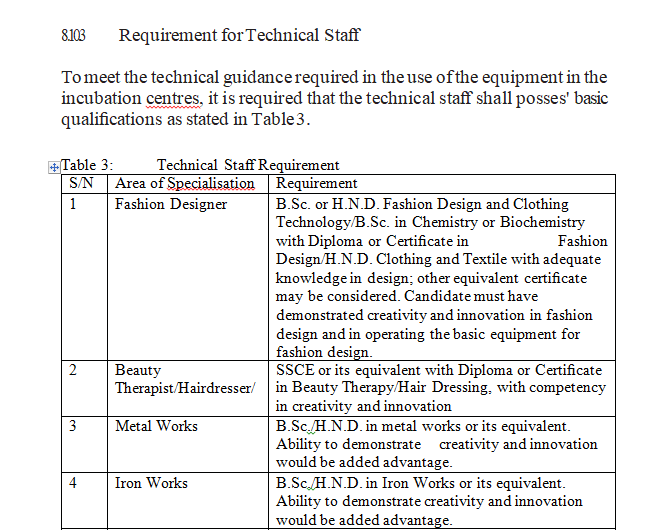
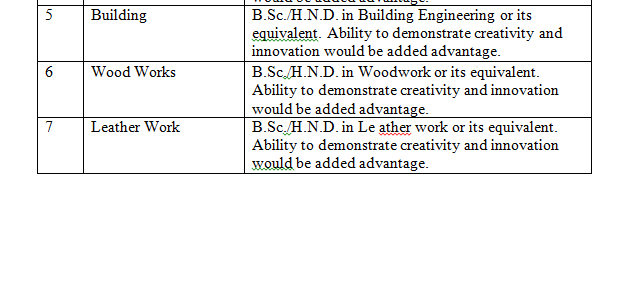
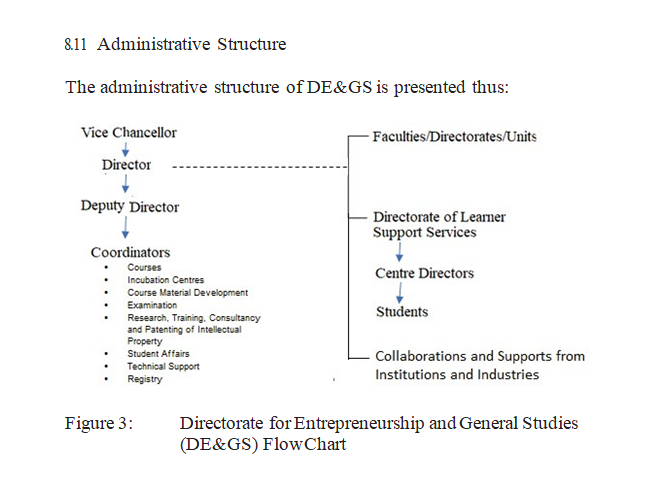
- Directorate for Entrepreneurship & General Studies (DE&GS) Academic Board
The centre academic board takes care of all academic matters including academic staff promotions.
Members of the board are:
- All academic staff of the Directorate
- All servicing Academic Staff
- Faculties and Academic Units Representatives
- The secretary who is the most senior administrative staff at the Directorate
- The Chair is the Director
8.1 Facilities
- Incubation Centres
Incubation Centres are created to provide opportunity for students with creative and innovative ideas for mentorship and start-ups.
- Human Resources Each Incubation Centre is to have:
- One Incubation Centre Coordinator who is an academic staff.
- Two/three Administrative Staff
- One Secretary
- A minimum of two technical staff who must be proficient in managing the equipment in the incubation centre
- Two clerical staff
- Two ICT staff
- Two securities Two environmental staff (Cleaners)
- Driver
- Physical and Virtual Resources to be made available at the Incubation
- Spaces are provided for staff office, mini office for the incubators, virtual. laboratories (to be furnished with chairs, tables, computers, wifi,), workshops, and exhibition
- Canon EOS Rebel T6 DSLR Camera Bundle with Canon EF-S 18-55mm f/3.5-5.6 IS II Lens + 2pc SanDisk 32GB Memory Cards + Accessory Kit
· 50KVA Sound Proof Generator.
- Basic office furniture for good working conditions for staff.
- Office space furnished with computers, tables, chairs, wifi, tables, board rooms, meetings rooms and coffee machines for
- Virtual
- Simulation IT software such as Dynaform and Atman Software to be installed in the computer in the
- One Smart Board 7000 Pro Series
- Five steel open shelves
- One Hilux Toyota Pick-ups for monitoring
- Workshops and Laboratories
These are provided according to need and available resources where the incubation centres are. For instance, Bauchi shall have two Laboratories for Mineral and Agro Research.
- Financing
The Zonal Coordinators receive monthly sum to run the zone.
- Sustainability
DE&GS shall be sustained through:
- Support from the University Management
- Governments
- Support from the Faculties
- Funded Research
- Partnership/Collaborations with relevant agencies
- Patenting and intellectual property
- Consultancy and Community Service
- Rewarding students’ innovation
- Mentorship System
- Sources of Fund
- TETFUND
- The university
- Government special grants/subventions
- Donor agencies
- Internally generated revenue by the Directorate
- 17 The Directorate for Entrepreneurship and General Studies (DE&GS) virtual presence.
DE&GS has a website to view our activities:
- Bridging the Nation’s Entrepreneurship Gap through NOUN
National Open University of Nigeria (NOUN) through its Directorate for Entrepreneurship and General Studies (DE&GS) shall fill the national entrepreneurship gap through the following:
- Organize mentorship programmes on entrepreneurship education and Entrepreneurship practices for all entrepreneurship centers in Nigeria
- Organize workshops, seminars, conferences that will bring the universities, industries and government together to discuss and act on vital entrepreneurial issues towards national growth and economic
- Collaborate with federal government to coordinate the activities in the government owned Incubation
- NOUN will collaborate with SMEDAN, NBTI and CBN to realize the mandate of providing entrepreneurship education and mentorships to MSMEs under their
- NOUN Entrepreneurship Needs
To meet with the entrepreneurship activities in NOUN and to support start-ups the following are required:
- NOUN students are in every part of the country. The current six incubation centres are limited in the provision of the required services to the We will therefore seek the support of the Federal government to support us with more incubation centres by building five incubation centres in each zone or give NOUN the access to take over the federal government/CBN existing incubation centres in the geo-political zones. When this is allowed, NOUN shall extend Incubatees’ admission to other Nigerian universities and tertiary institutions.
- Going by the needs of NOUN incubatees which were found to also be the need of the nation, we urgently need specialised laboratories and workshops for refinement and production in the following areas:
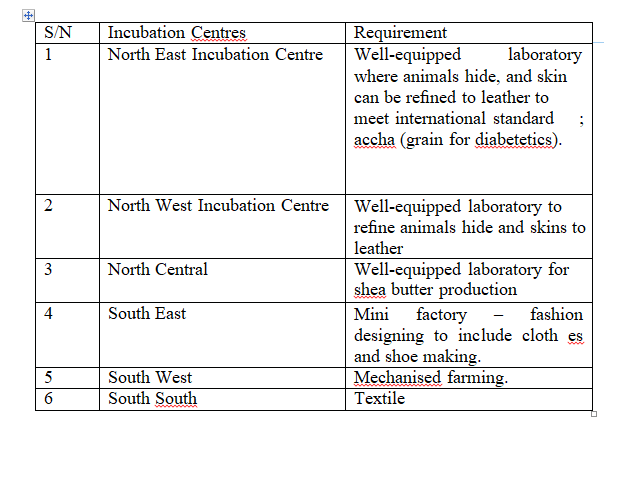
- We need access for our Incubatees to use the technology incubation centres provided by
- NOUN needs monetary support which shall be grant or take off seed from Federal Government and Central Bank of Nigeria (CBN) to aid start-ups. Students with innovative ideas are to be supported with this fund. We suggest that as student wins the grant, the cash shall not be released to the student. An account which will be controlled by CBN shall be opened for this purpose and disbursement shall be made based on the approved work plan and achievement of the NOUN and Federal government/CBN shall agree on the Performance Indicators.
- The Incubation Centres need equipment for Artificial Intelligence, robotics that will help students simulate
- There is also high need for IT equipment such as simulation animation Software for the
References
BUK; ABU; UI; Nsukka; FUNAAB, Abeokuta; & YABATEC (2017).
Personal experiences gained in the visit tour/understudy of their Entrepreneurship Experiences.
Central Bank of Nigeria Bullions
Federal Republic of Nigeria (2013). National MSME Survey Report.
Small and Medium Enterprises Development Agency of Nigeria (SMEDAN).
National Board for Technology Incubation (NBTI), Federal Ministry of Science and Technology – FMST (2015). 2014 Annual Report.
National Universities Commission (2010). Draft Curriculum on B.Sc.
Entrepreneurship Studies for Nigerian Universities.
National Universities Commission (2013). Benchmark Statements on Student Support Services and Facilities in Nigerian Universities.
National Universities Commission, Department of Student Support Services (ND)). Guidelines for the establishment of entrepreneurship study centres in the universities.
YEDAC (Young Entrepreneurship – Developing in Action) (ND).
Models for developing and planning entrepreneurial education. Retrieved from http://www.yedac.eu/media/3136/Models-for-
developing-and-planning-entrepreneurial-education-
Professor Inegbedion, Juliet O.
Director, DE&GS
Appendices
Appendix 1: Requirement for Setting up Incubation Centre
- Facilities
- Incubation Centres
Incubation Centres are created to provide opportunity for students with creative and innovative ideas for mentorship and start-ups.
- Human Resources Each Incubation Centre has:
- One Incubation Centre Coordinator who is an academic staff.
- Two Administrative Staff
- One Secretary
- A minimum of two technical staff who must proficiency in managing the equipment in the incubation centre
- Two clerical staff
- Two ICT staff
- Two securities Two environmental staff (Cleaners)
- Driver
- Physical and Virtual Resources
- Office spaces for staff, and mini office for ten incubatees,
- Space for virtual laboratory for about 50 workspaces
- Furnitures – office chairs and table for the Coordinator, office chairs for the staff and Incubatees, visitors waiting chairs, ten steel cabinets, 16 glassed steel selves,
- Space to serve as exhibition
- Display selves and tables for exhibition room to accommodate 50
- 60 pieces of iMac Pro 2GHz 8-core Intel Xeon W with Retina 5k display computers.
- Viable internet connectivity (high bandwidth)
- Two 13 inch MACBOOK Pro 3GHz dual-core Intel Core i5 with Retina display
- 5 Black and white Printers
- I coloured A1
- 1 3D printer and accessories
- Public Address System
- 5 Scanners
- Three Canon EOS Rebel T6 DSLR Camera Bundle with Canon EF-S 18-55mm f/3.5-5.6 IS II Lens + 2pc SanDisk 2TB Memory Cards + Accessory Kit
- Two High definition Sonny Video Cameras
- Video Editing Sotfware (Adobe premier suit)
- 50KVA Soundproof
- Model office space furnished with computers, tables, chairs, wifi, tables, board rooms, meetings rooms and coffee machines for
- Virtual
- Simulation IT software such as Dynaform and Atman Software to be installed in the computer in the
- Three Smart Boards 7000 Pro Series
- One multimedia projector and screen
- One Hilux Toyota Pick-ups for monitoring
- Workshops and Laboratories
These are provided according to need and available resources where the incubation centres are located. For instance, Bauchi might have two Laboratories for Mineral and Agro Research.
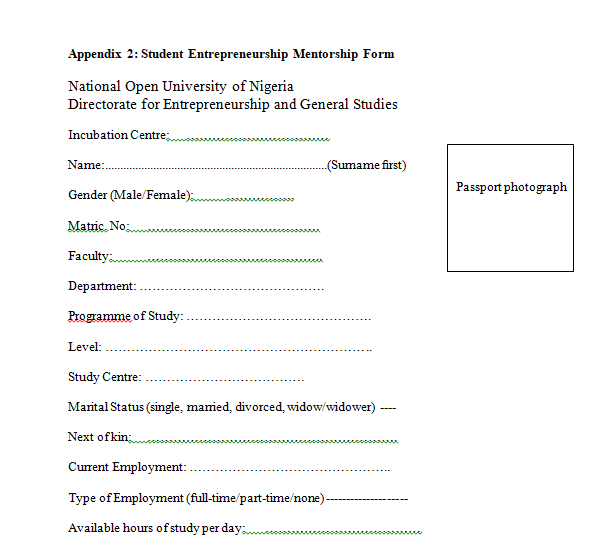
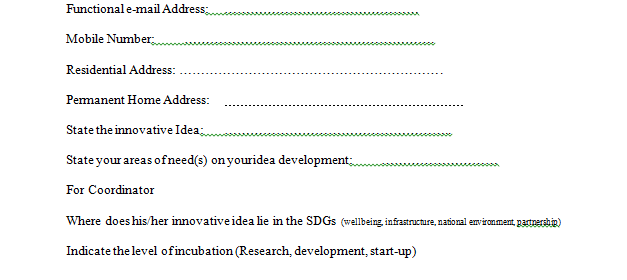
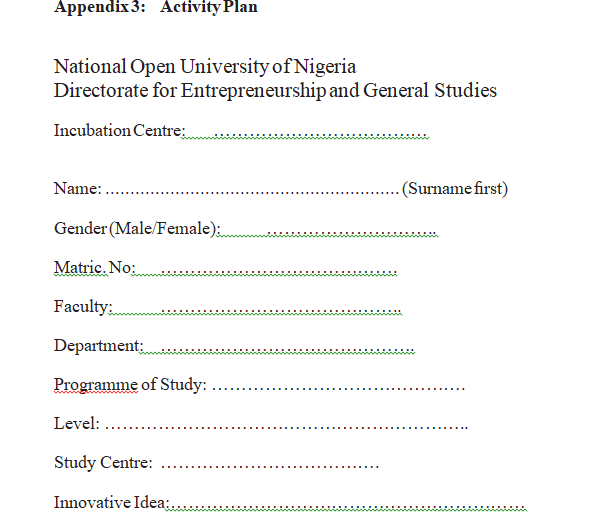
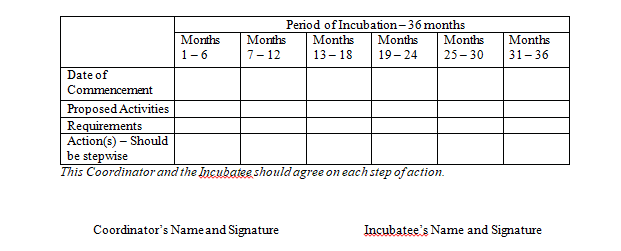
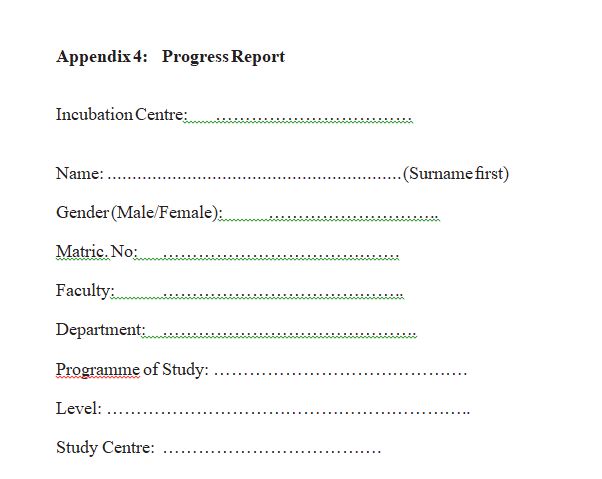
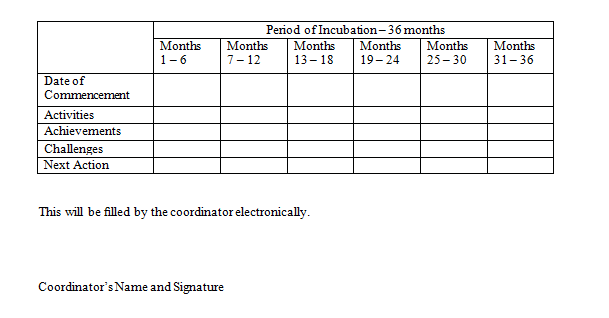
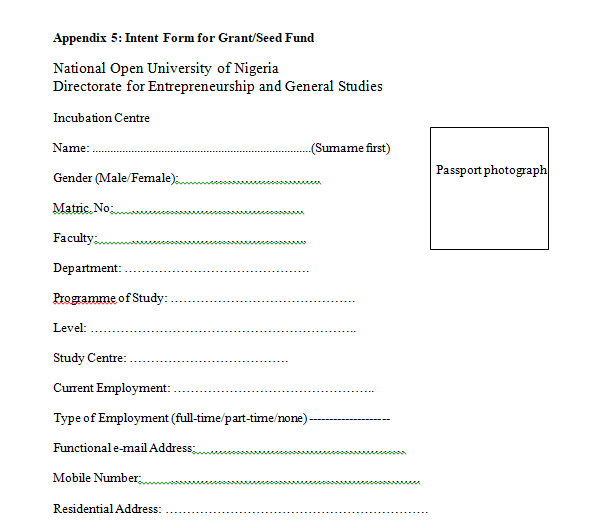
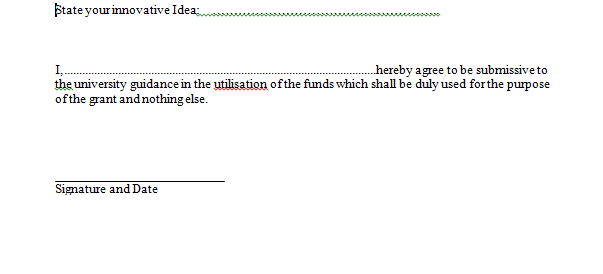
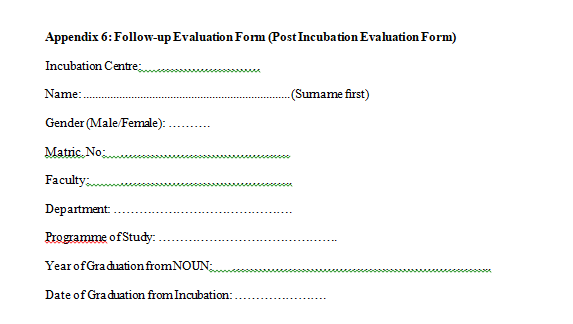
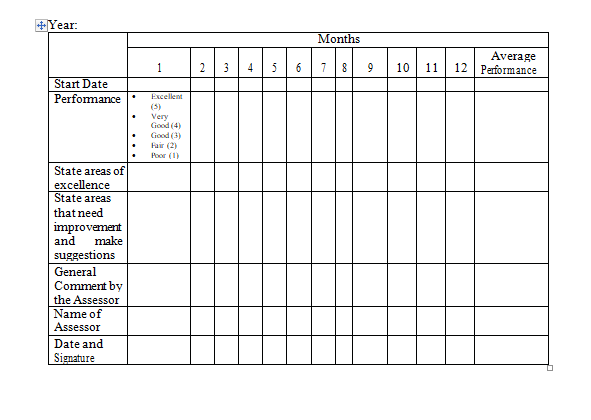
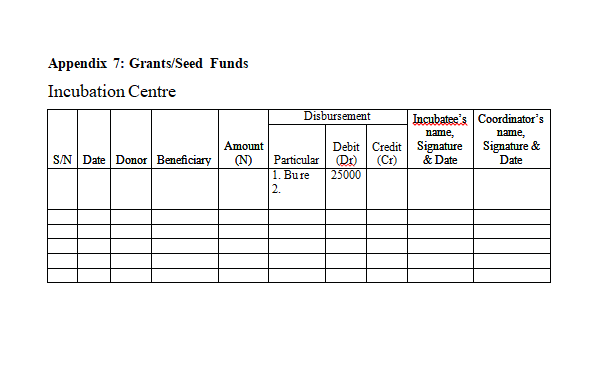
Appendix 7: Others
- Sharing Formula for Income Generation from Incubation Centre:
- The net income generated by an incubatee should be shared at the ratio of 50:20:20:10. This means that 50% of the net profit would be saved for the student start-up, 20% will go to the student for his/her upkeep during the period of incubation, 20% would be retained at the incubation centre for upgrade and administrative occurrences, while the 10% will go to the
The University Bursar shall provide the account number where the start-up savings of 50% and the university 10% would be credited. The account is to be credited at the end of every 28 days from date of commencement.
There must be proper documentation of all incomes and spending at the Incubation Centre. An accountant from Bursary shall be in charge but where not available the Coordinator has to do it.
At the end of the incubatee’s incubation period the start-up saving shall be received to rent, purchase necessary equipment, register the business name, and all that is required for the start-up. It is only 5 – 10 percent of the savings that shall be given to the incubatee in cash on the day of start-up while the other money will be translated to what is required for the start-up such as equipment, shop etc. The start-up shall be launched by the Vice Chancellor.
The Coordinator must ensure that the intellectual property of the incubatee is protected. Therefore, must work with the Director, DE&GS and Director, DRAA.
- Part of the administrative fund shall be used to follow-up incubatees especially those that are non-resident and to organise local programmes that will benefit the Centre
such as exhibitions, seminars, and advocacy.
- Entrepreneurship Week
- National
- Zonal
- Writing a Business Plan
- Executive Summary
- Product Idea and Description
- Proposed organisational structure
- Market Analysis
- Financial Analysis
- Sustainability
